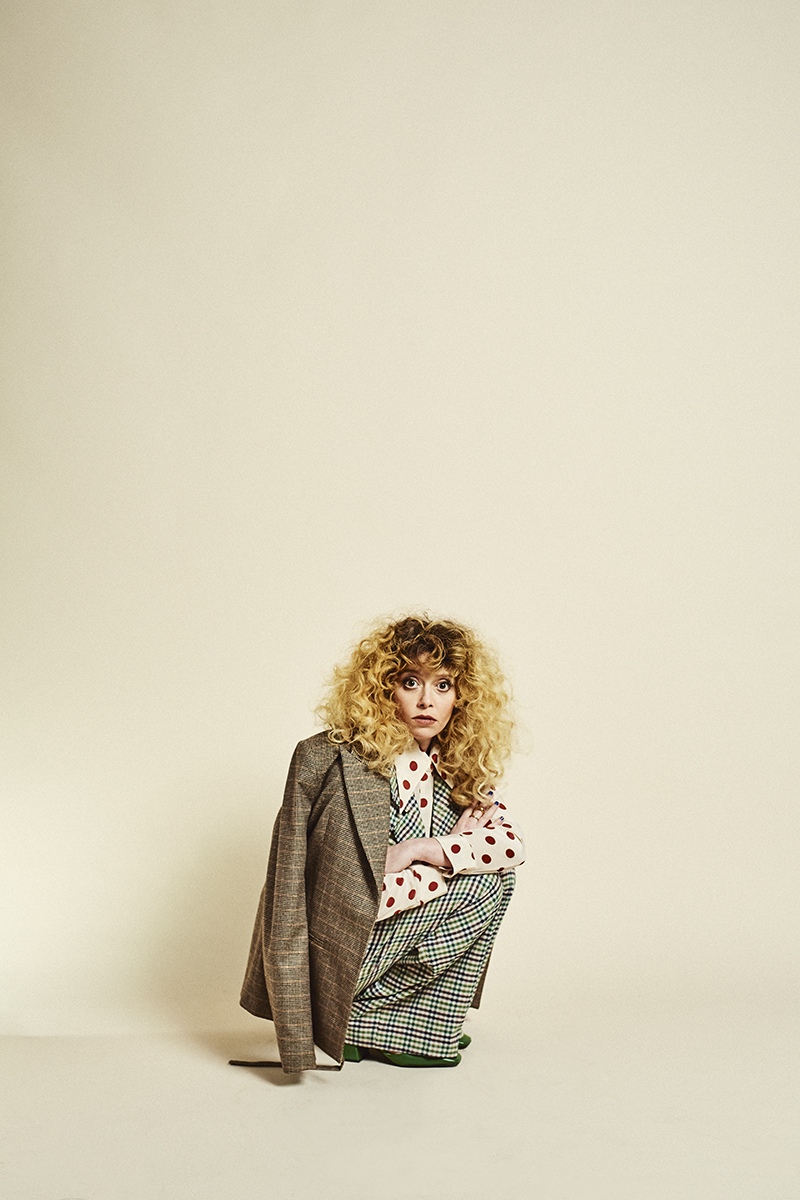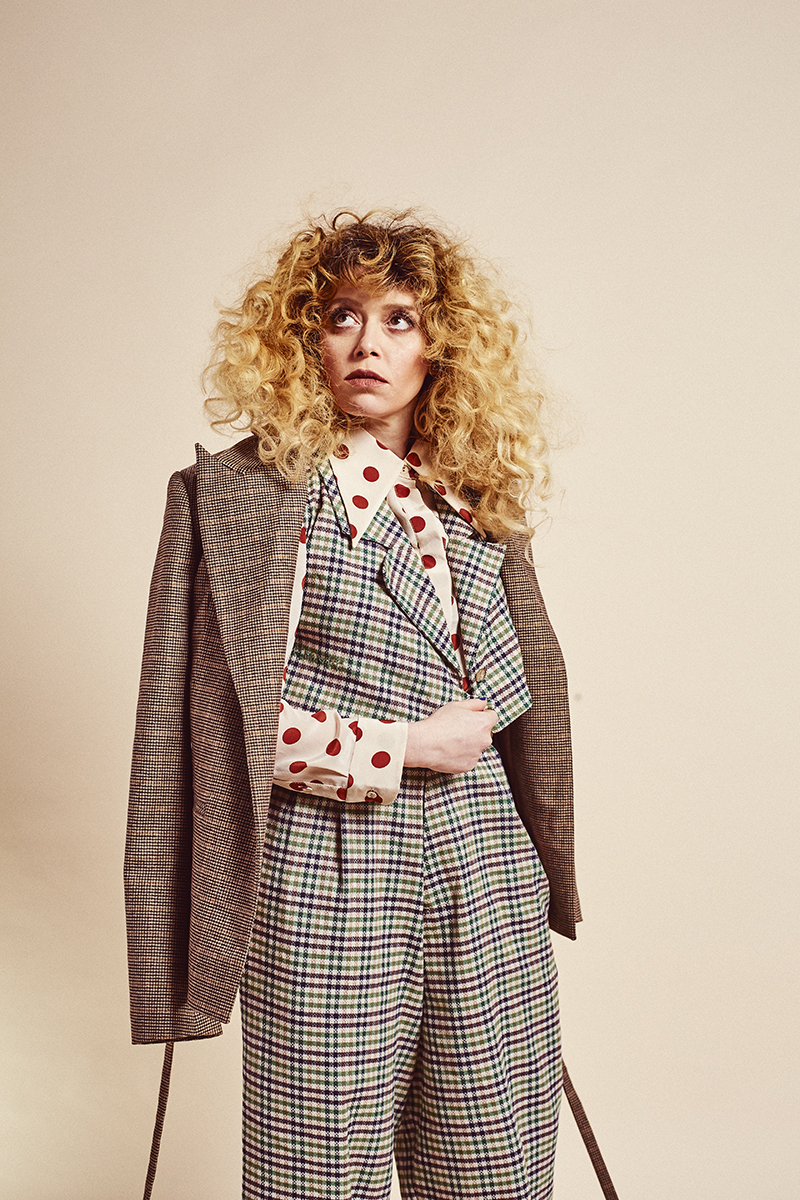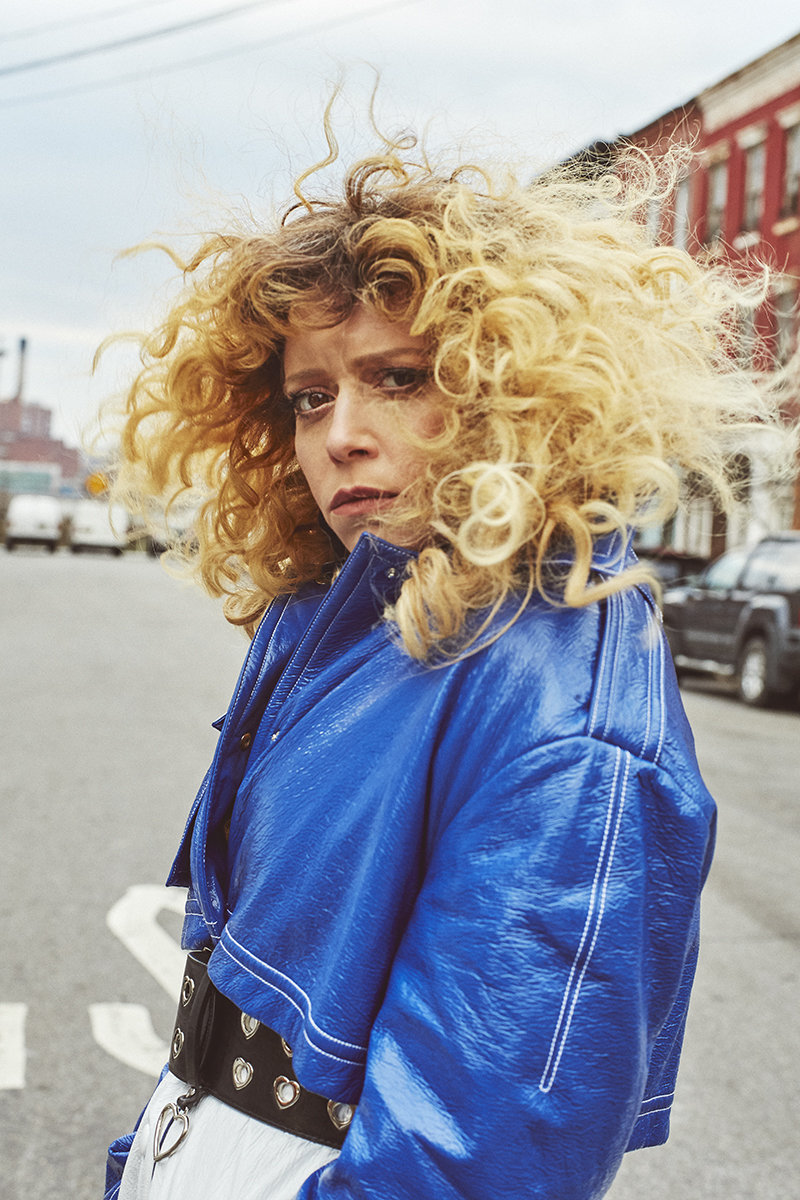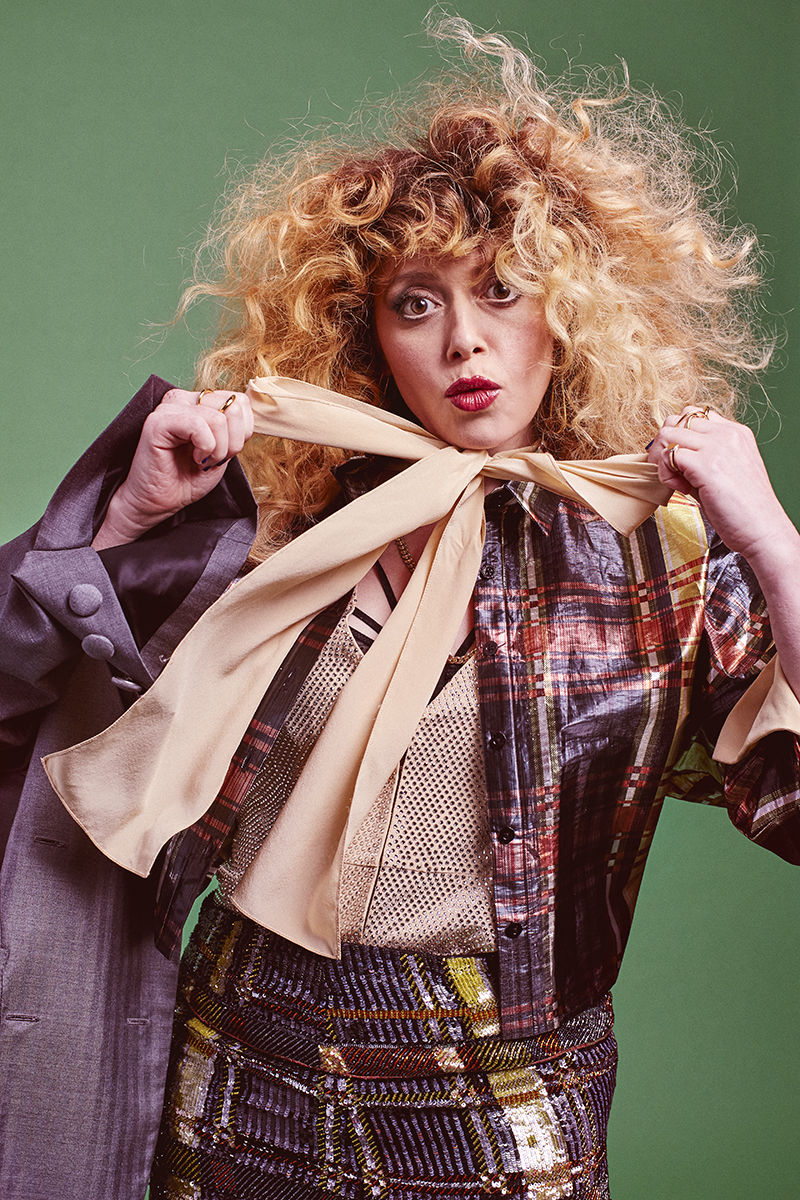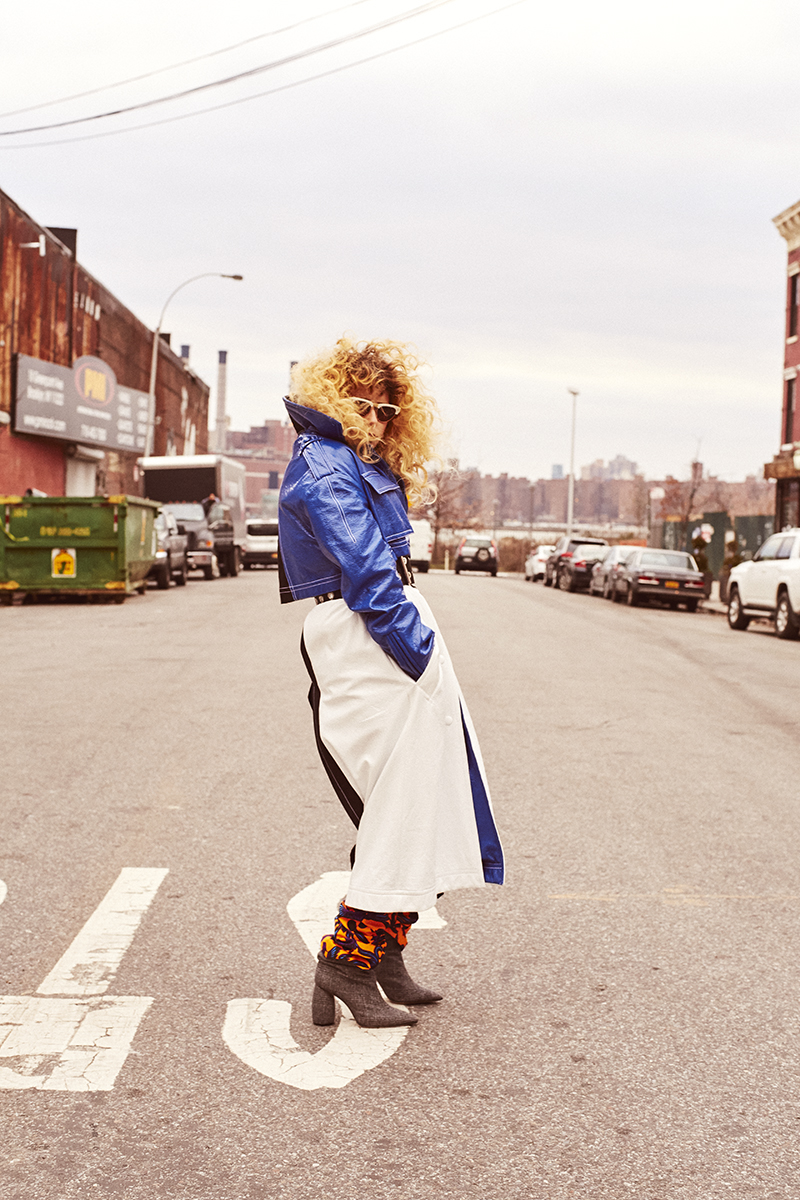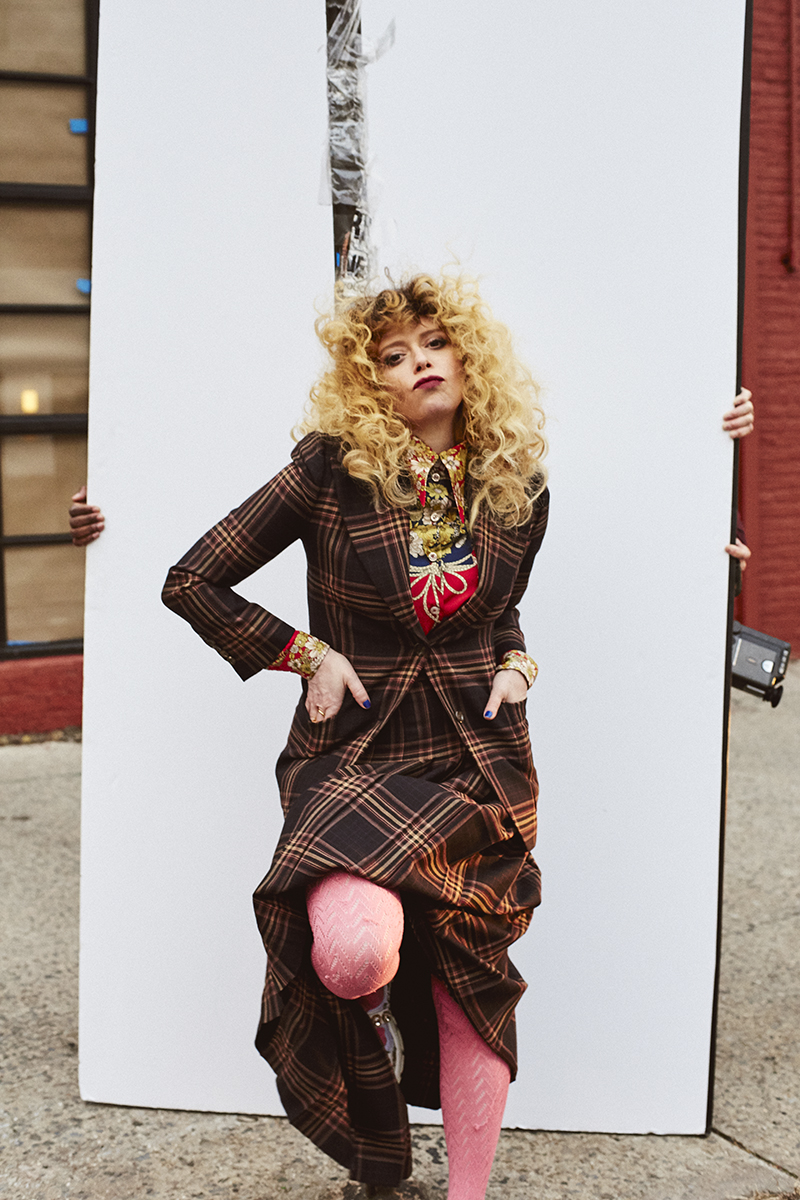PHOTOS / Brayden Olson
STYLING / Shea Daspin
MAKEUP / Alex Byrne using Sisley Paris
HAIR / Jillian Halouska @ The Wall Group
NAILS / Gina Viviano @ Tracey Mattingly
STYLING ASSIST / Nicholas Collins
STORY / Talullah Ruff
It’s a rarity in the entertainment industry to watch child actors grow into successful adults. Not only can it be brutal to grow up with the added weight of extraneous expectations, but especially brutal because those people expect you to fail. People love to watch their stars fall. And then they love to watch those stars make a grand comeback, just for the spectacle of it.
Natasha Lyonne proves that there is dignity in allowing your humanness to shine through, and there is dignity in slowly building yourself up piece-by-piece. These acts are necessities, in Lyonne’s view.
Her first role was at age six on Pee-wee’s Playhouse, and from there Lyonne went on to star in Woody Allen’s film Everyone Says I Love You, and cult films such as American Pie, But I’m a Cheerleader and Detroit Rock City. But in the midst of this success, Lyonne stresses that she was just another teenage girl who didn’t know how to live in her own skin, who didn’t think she fit in the industry– and imploded because of it. Her party-girl lifestyle rapidly became detrimental to her life, landing her in the hospital with a collapsed lung and a heart infection– but more importantly to media outlets, the lifestyle was detrimental to her name. Never-mind that she worked steadily on both the big and small screen until 2005, with just a two-year hiatus: she was no longer judged by the merit of her work but by the loudness of her not-so-private-life and drug-induced behavior.
Orange is the New Black is looked at as her comeback, but Lyonne’s Nicky Nichols is just one role in over fifty films, twenty television shows, and four plays. Appearing in as many as six movies a year, Lyonne amassed guest-starring roles on television shows such as New Girl, Weeds, Girls, and Portlandia. Despite these successes and her rehabilitation, people are still quick to mention the negative side of her past. But even when people thought she was drowning, Lyonne was fighting her way towards betterment.
Lyonne’s new project, Russian Doll, is a reclaiming of her life and her artistry. After years of uncertainty in the entertainment industry, struggling to regain her footing after her struggles in the early 2000s, Lyonne made manifest the struggles and the “broken” parts of herself in order to take back her own narrative. Along with co-creators and executive producers Amy Poehler and Leslye Headland, as well as a predominantly female crew, Lyonne uses Russian Doll to exhibit her ideas on love and life. But she wants viewers to know that this is an existential journey: this is not about a specific gender or sexuality, but about the quest for the self. In blending the fantastical with the autobiographical, Lyonne dares her viewers to confront the perils of life as they would the threat of death. And in that way, she dares us all to live honestly.
I had the privilege of talking to Lyonne about finding the humanity in our daily lives, what it means to be a woman, and the implications of her new show Russian Doll.
Obviously, you’ve had such an incredibly expansive career– and you began when you were just a kid– so at what point did acting and being a part of the entertainment industry become YOUR dream? Have there been jobs that were just jobs for you and jobs that you felt especially passionate about?
Yeah, you know it’s an interesting thing when you go into showbiz at such a young age and it’s not a choice, to kind of reconcile that with doubling down as an adult, with free will. I would say that it’s a lofty position to be in now that’s pretty hard-won, and I feel so much like everything kind of went the way it was meant to go because now I’m so thrilled to be lucky enough to get to do this for a living. And yet, there were so many years where that was not my experience. So, early days of it, I think I definitely saw it as fun before it became kind of this weird job that I had. I think Pee-wee’s Playhouse was a very pure experience for me that I loved so much, and I just thought the nature of that, the production design of the imagination land that was the show was just so extraordinary, and Paul Reubens was amazing, and just everything was like a literal child’s playland, and I think that I really loved that. I think it got sort of darker later when it became sort of about almost like being aware of things like comparing yourself to other people and losing jobs or that it’s about money– I think I just sort of woke up to that maybe by ten, between ten and fourteen, it was a little bit rocky in there– I think early days were pretty pure. And there would be weird things, I mean I remember doing a Minute-Maid commercial and having to just drink so much Minute-Maid concentrate, and at the end of the day you’re just woozy and you’re trying to smile and say the line, and it’s really almost psychedelic because it’s this bizarre kind of sense memory association with smells that are kind of like [throws you off the beat] on any given day and you’re like oh fuck, there’s that concentrate smell and it sort of stays with you. But I think none of that… I think that was also pretty fun.
And then I think it was kind of sort of early female… when you first discover that you have a body and it’s not like all the other girls’ bodies and you’re supposed to be in some sort of competition or despair because of advertising and the other girls at the school, and you’re kind of uncomfortable in your skin anyway, but you’re like simultaneously auditioning and not getting parts because you’re weird and you have curly hair. I saw this old footage of myself from an audition tape and I’m wearing a weird mock turtleneck with my big frizzy hair and my thick New York accent and I’m talking about being on the lunch line, and the next audition tape is like Uma Thurman, and it’s so evident that I’m not getting that job, you know? And it makes me feel sad for that like I feel now as an adult person keenly aware of that inner child in a way and I almost want to protect her from this idea that she wasn’t enough and that she should later self destruct because of it. Because she was just sort of other and herself. And it was kind of suddenly in an industry where I think I then spent a lot of years being like, “Why aren’t I a blond girl with blue eyes who’s also a wallflower but with a little air of mystery,” you know what I mean? It’s like, instead I was kind of just stuck being who I was, and I hadn’t quite made sense of the fact that that was exactly my thing. I think that came later.
And I think much later. I think literally only– I mean, my kind of good news to young girls that I really want them to know is, I weirdly think that life gets a lot better at, I wanna say even thirty-five. Like I think that there’s so much of an illusion, a false bill of good that mass media– the patriarchy for lack of a better word– try to sell you on that for some reason your prime years are thirty-five and under, and then you’re yesterday’s news somehow, and I just think that’s way, way off the mark of reality. Like, I think we’re actually in an incredibly optimistic time in that sense where we’re finally getting to see just how untrue that is. And that those are kind of the really uncomfortable years, and I can look back now and see that showbiz wasn’t demanding that I was different, they actually wanted the curly-haired girl from Pee-wee’s Playhouse, and later from Slums of Beverly Hills, who was kind of a little bit weird and her own kind of random thing. Like, that’s all they wanted from me; it was my own teenage discomfort in my own skin that made me feel this universal experience that there was something wrong or broken with me that needed to be snuffed out. And you know, it wasn’t until much later when I had this kind of second-round at life and at being a part of this business, where that ingenue ship had already sailed, so I had to reconfigure what it meant to me to be a participating member of the arts. And it was only then after a lot of dark nights of the soul and a lot of work and a lot of off-broadway theater and trying to write things and failing at writing those things– it was only then that it started to click into place that like, “Oh wait a minute, maybe I’m just supposed to be myself and maybe that’s enough.” You know? I tried everything else first. And I think a huge part of that was the experience of working on Orange is the New Black. I think that that was an extraordinarily healing show, and an environment of otherness celebrated as extraordinariness. And I think in the course of those seven years of that sisterhood of singularity, individuality, that I really started to find my own solid self-worth that would position me well for telling my own story in such a personal way without shame or reservation.
There was a question I was going to save until the end, but it kind of feeds into this question that I’d love to know, about what advice you have for young women and young artists– you know, how to stay strong, how to keep motivated and embark on a powerful career like yours.
Well, I mean, I do think that it’s an issue that’s very important to me and very close to my heart, it genuinely matters to me. And it seems like everyone I love has had so many dark runs of being in emotional pain, and of course when you’re sitting on the outside and looking at your friend, you love them so much, you can’t imagine treating them the way they treat themselves or seeing them the way they treat themselves. And my hope would be especially like, there’s so many– Orange was really amazing, and it gave us this passionate fanbase, and I wasn’t on any of those things, like you know, Netflix gave me a Twitter account so that way we could do Orange is the New Black [unintelligible] because it was effectively a web-series at that point, like Netflix didn’t really exist yet. They were like, you have to go on this, you have to put on that, you know. They were encouraging these personal interactions with the fans and over time that really of course started to mean something to me because they were fun and funny and artistic and special. And so it all sort of became important to me all over again, and feeling sort of very protective over them, and my friends and– like I’m saying– this little girl version of myself, too, that I beat up so much for so many years.
And I do think the back of all that is this need for us culturally to embrace and accept our underlying brokenness as an aspect of self that is nothing to be ashamed of. That is just kind of part of the fabric of the human experience, it doesn’t mean, like yes it’s a privilege to be allowed to think about one’s own discomfort and not just thinking about where your next meal is coming from, absolutely. But you know, just the idea that we even live in a world that has so much widespread injustice that feels so overwhelming psychically, to get a day to be socially aware, whatsoever person, is its own conundrum that causes kind of colliding thoughts and existential dilemmas around, “What does it all mean?” and “What’s the point of it all?” Those are very natural feelings, and to try to figure out where you fit in as individuals in a world that feels so broken is a very natural sort of thing. You know, and to not be kind of pushed down and beaten by that, but just to understand it, to see it as a truth, to have acceptance around it, and to feel emboldened to take a kind of personal action around it. And whether that just means sensitivity to oneself and kind of being gentle where you would generally be self-flagellating. Because we saw a picture of ourselves that we hate or because we think our whole existence is meaningless, you know what I mean, there are so many levels of how we beat ourselves up. And that’s normal and okay. And you know, this idea of wanting to be a participating member of life to see how we can help out in this world.
There’s kind of a false belief system in there where we think that self-loathing keeps me separate from everybody else in a way that it’s so dark that I don’t have to participate. And that’s not true– we’re actually pretty connected to each other, and I think so much of what Russian Doll is about is that we need to kind of allow ourselves to be seen by other people and connect with other people, and it’s okay and it’s safer than it seems. It’s scary and it’s vulnerable, but it’s a worthy cause because the world needs all of us. So like, I wanna see these kids get to grow up not to just beat themselves or be afraid or beat down by like– you know the things in our culture, whether it’s in America or whether it’s in Brazil, all over the world, we see this horrific dehumanizing of the LGBT community in ways that are just devastating. When I think of even my friends or people that are older than me, let alone young people trying to make sense of how is this a world where people refuse to accept me as an equal. It makes me really mad. I think we see it racially daily in a way that is harrowing, and I think we see it for women all the time. There’s a lot of good news happening and always for many groups of us that have been historically down, there’s kind of good tidings and simultaneously devastating blows. And trying to make sense of both those things happening at the same time and wanting to go on is a lot to expect of young people in their formative years. And I very much hope that this show is celebrating that struggle and saying that, you know, don’t quit. Don’t drop out. Give yourself a chance because you’re entitled to it.
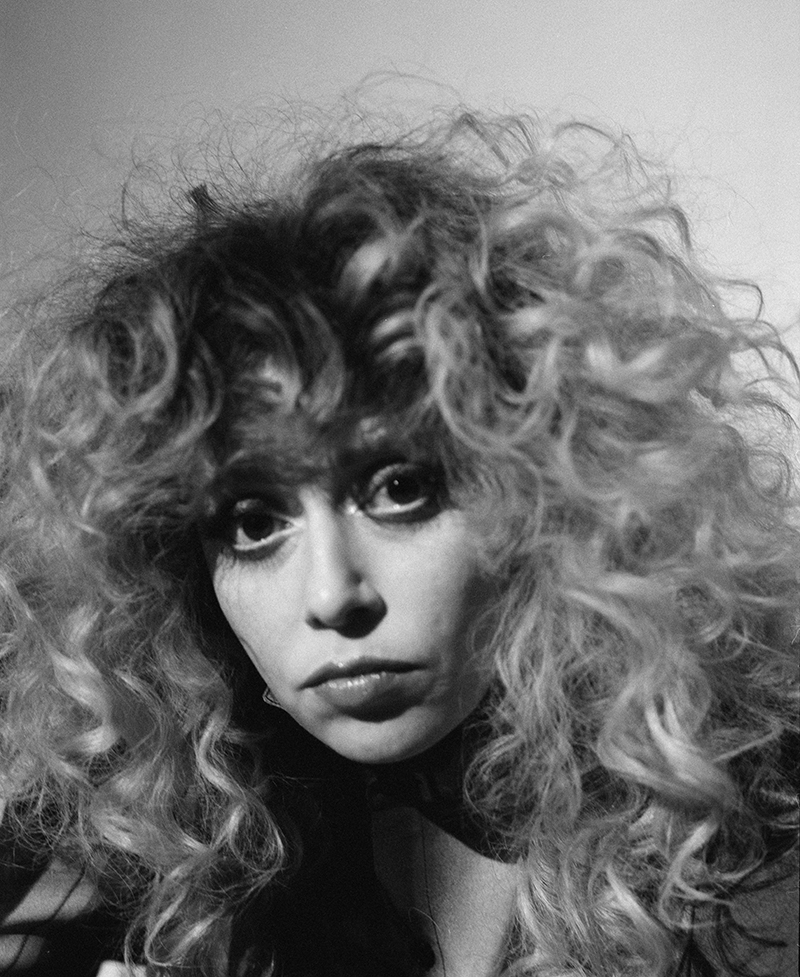
I think you’ve sort of answered one of my next questions about Russian Doll, because I was reading one of your interviews where you were talking about how it’s more of an existential journey: not a story about a specific gender or the quest for romantic love, but a quest of the self, which I thought was really cool. So, I was wondering why you decided that it was important to make sure this kind of story was told? Which you kind of answered, but I’d like to hear you talk more about that.
Yeah, I think it’s definitely at its bones more of an existential adventure show than it is a Groundhog thing about just, you know, she’s dying and coming back, she’s stuck in a loop. I think that, I mean, I love Groundhog Day, but I think that’s more of a jumping-off point for something that’s more personal to my experience of being close to death many times and having to choose to keep returning to life, or just find myself still not dead and trying to make sense of everything, and I think that feels much more personal to me than a movie device. If that makes sense.
Yeah, definitely.
And in terms of the architecture of how I’m sort of thinking about it is that it feels very personal for me to tell my story in this way, in a way I think is similar to Bob Fosse and the way he told his story in All That Jazz, and Richard Pryor and the way he told his story in Jo Jo Dancer, Your Life is Calling. Like for me, that’s a very personal tale. That said, you know, the character of Nadia– whose name is based on my love of Nadia Comăneci, the great gymnast from the ‘80s, so I always make her my kind of character name in anything I write. And I think I sort of thought of her as this genderless person, which is something we see with men often; like the character was based a lot on the famous detective character Philip Marlowe– who Elliott Gould plays beautifully in the movie The Long Goodbye– which is a lot of the reason Nadia mumbles to herself and stuff, and is always the detective on the case a little bit, trying to crack her own case. And you know, Jack Nicholson who played Philip Marlowe in Chinatown. I always sort of identified with those male characters or even the way Martin Sheen would stare up at the fan in Apocalypse Now and just be thinking to himself.
And I think that even like if I was sort of a millennial, I don’t know if I would even identify as female. I think that at this point I do and I love women so much that I’m definitely proud to be a woman and it feels true to who I am, but in some way when I look back at my life and certainly when I look forward at the kind of characters I wanna build and what I see a woman as meaning, it’s a much more genderless quality than I think historically the word woman has been imbued with. I don’t think I see my womanhood as this architected idea of like Doris Day or Marilyn Monroe or something. I see it as much closer to like a Harry Dean Stanton or a Dennis Hopper type-of-thing, you know?
So, I just think that she was kind of like a character in a weird way who treated sex– you know that’s something I’ve been saying for a long time since the first episode you know– that the one and practical application just means the one I’m gonna die with. So, you’re better off waiting to find them until you’re in your late ‘60s and then you wanna settle down. So that was kinda a run that I’ve been sort of selling and writing for a while, of that idea that’s kind of, I mean if you look at divorce rates like, who wants to get married, in a way, early? The time to get married is probably when in your late ‘60s so you can actually stay married to that person because you’ll need to take care of each other and you guys are kind of like, too tired to sow your wild oats.
So, I don’t know what that means vis-a-vis, like, what a woman or a man is or female or male sexuality, but my adventures in New York have always been that: you wanna wear sensible shoes and a uniform so you can move through the streets safely. And I think all of it is [unintelligible] wants me to see a New York the way I see new york. My world in New York is kind of, there’s not a lot of, everyone is black or white or Spanish or whatever, everybody kind of is gay or straight or other, it’s almost kind of like people are sometimes [unintelligible] it’s like there’s a lot of sort of orbiting people on a similar trick rather than separated by things that we generally think of as distinguishing groups, and I personally would like to see that not be a thing anymore. I think it’s pretty outdated. I don’t feel comfortable inhabiting spaces that do not sort of well, integrate into my life anymore like I always feel a little bit uncomfortable. And that’s everything, I just don’t want to live in a Stepford-wife-world, it makes me very uncomfortable. Not the world I wanna see in the show. So yeah, maybe that answers that.
You know, just watching a little bit, I just wanna say that the cinematography to me seemed like it highlighted in a really cool way the surreal elements of the story, in my opinion. So I was just wondering how you’ve started to develop your directing style– do you think your style has differed from each of your projects?
So, Chris Teague who is our cinematographer, he is amazing. He did Obvious Child, now he’s doing Glow, and he’s just awesome. So, a lot of it was kind of, there were a bunch of movies we were referencing, including After Hours and Scorsese movies, and Ladies and Gentlemen, The Fabulous Stains, that’s a movie I really love… Sid and Nancy. And kind of like these specific portraits of New York that would– like you said, I’m glad you felt that way– kind of bring you a bit of a heightened sense like you’re living in kind of a slightly, like it’s not magical realism but that there is just, where it would be appropriate that there would be a little bit of that feeling that would help you go along on that ride. So yeah, I think we worked really hard on that and he did such a beautiful job and there’s a whole world of references that went along with that. Leslye Headland did a beautiful job also, we spent so much time together really building and forming a language together of what the world of our show would look like. And you know, every piece of music in there I hand-selected and was really obsessive about, and every picture on the wall was usually a real reference from my life. For example, that William Burroughs picture that says, “Life’s a killer,” is a real thing and is really hanging in my house. So, there’s a lot of really specific stuff that was woven into the fabric of that show to create a whole world.
Awesome. Just bringing it back a bit out of order, I just wanted to ask, I read that you grew up with Orthodox Jewish parents, is that correct?
Well, they were both basically the black sheep of their highly Orthodox families. In the ‘80s, my family left New York and went to Israel for tax evasion purposes and at that point, my father had a long black ponytail and was a boxing promoter, and his dream was to become the Don King of Israel and to bring Mike Tyson to the [unintelligible]. So, I grew up in a real boxing household in that way. But then his parents were like very Orthodox Jewish American Brooklyn Russian Jews, and they lived in Flatbush in New York. And then on my mother’s side, she was this wild redhead and she really did drive a red Alpha Romeo Spider and the [unintelligible] really did happen, and the only difference is she was listening to Tina Turner. The other song she really liked was “Knights in White Satin” by The Moody Blues. And she would pretty much listen to Tina Turner and that song on a loop. And drive in her red Alpha Romeo Spider and [the shell I think] is blue because we couldn’t get a red one. And she was sort of this wild child ‘70s character whose parents had been Hungarian Holocaust survivors, so they survived Auschwitz. So, my parents themselves were these very wild characters in the ‘70s and ‘80s, who both are now dead. And their parents were both very religious. But then as a result when my mother left my father and came back to New York alone, we didn’t have money, and her parents paid for school and they insisted that I go to this Orthodox school on the upper east side. But you know, I was a scholarship kid and a weirdo, so that was kind of like early days when I was starting to understand that I was kind of like, other. And I didn’t have one of those Park Avenue mansion apartments, and I didn’t have the right clothes from Bloomingdales and the Gap or whatever they were shopping at. And pretty soon after I became a troublemaker and a school pot dealer. And then I was expelled.
So how did this family dynamic play into your start in acting? Because you started so young, so I was wondering how that played into it.
I think that they were just kind of wild and as I said, Don King was a big hero in the house and I think that they just wanted their kid to be fucking Shirley Temple, I don’t know what to tell you. The big part that I lost that was hard for me to tell, was Curly Sue, I still resent them for that. I think they should’ve given me that job.
So now that you have acted, produced, written, and directed– I’m listing some of your achievements at you, sorry–
Thank you.
– what are some of your creative goals going forward?
Well you know, I think I’ve had these really incredible mentor figures who’ve decidedly impacted my life in their support of saying, “Hey, I believe in you, you can do this.” And I think in some ways that started with Nora Ephron and her sister Delia Ephron, while I was doing Love, Loss, and What I Wore, and they were kind of like saying, “Hey, c’mon kid, do this.” And then later with Jenji [Kohan]. And she was very supportive of it, and I just turned in my director’s cut for one of the final episodes for the final season of Orange. Then Poehler is wildly fucking the most incredible figure in my life, and was really like, “You can do this.” And I think also Netflix was incredible, and Cindy Holland in particular, who was a sort of safe haven for me. And now I feel so good that this show, my story in a way is off my shoulders. I started this production company called Animal Pictures with Maya Rudolph, who’s one of my oldest friends, and we made this short fashion film for Kenzo together and we loved collaborating on that so much. And so it’s thrilling to me to get to do this production with her and help new voices get out there and tell more stories and just really continue to be a creator and always continue to write, direct… I’d like to make a feature soon. I really feel like I’m finally feeling settled in the arts and very moved that there’s a real place for me. So I just fucking, I’m so excited to be a grown-up who gets to do this for a living and be a shot-caller. So, I wanna help other people get their stories told and I wanna keep contributing to the arts, and I feel like that would really be my dream. I’m so excited about the different shows and movies that Maya and I are working on right now, it’s what I spend most of my time on and what I find really exciting. I just want to keep doing this and digging deeper and digging funnier and digger darker.
That’s amazing, I’m so excited to see more of what you’re going to do next, really.
I would like to be like the Wu-Tang of Production Companies and hopefully, that means getting deeper into the spiritual principles of kung fu, and by that, I mean continuing to do my best, to tell the truth.
Skirt +suit + shirt+ tights+ shoes, Gucci. jewelry, Lady Grey.
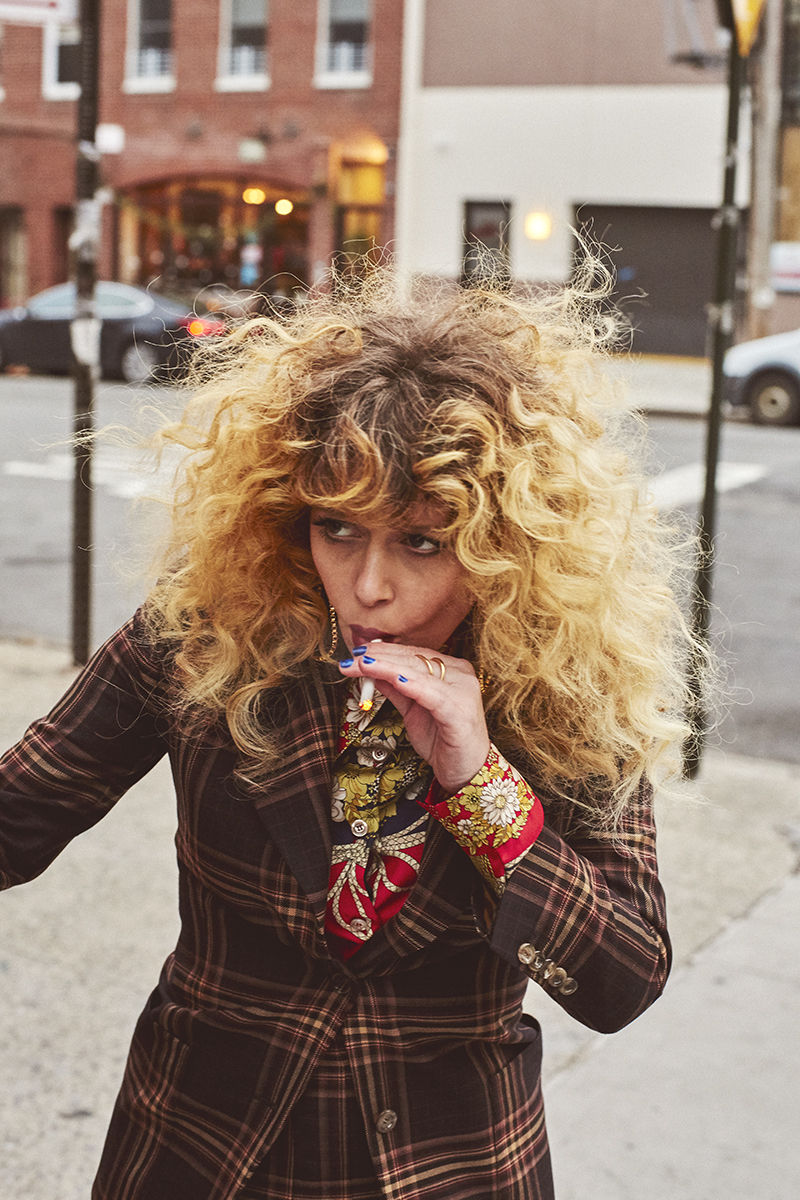 .
.
CONNECT WITH Natasha Lyonne

